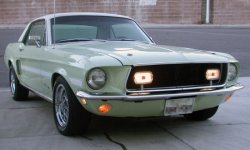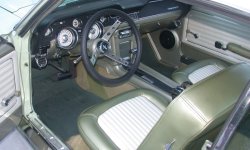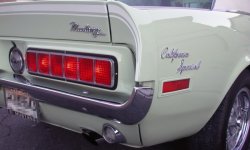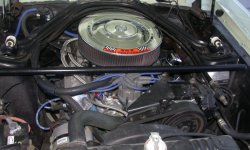Boomer-ing Sales at BJ
Looks like da boomers are pushing up prices across the board on muscle cars. Below is an excerpt from an article in BizWeek. Thought folks would be interested...
http://businessweek.com/magazine/content/06_06/b3970120.htm
"FEBRUARY 6, 2006
Muscle Cars Roar Onto The Block
Muscle Cars Roar Onto The Block
Motorheads are making vintage gas guzzlers the new stars of the auction scene
Every year, thousands of motorheads from around the world flock to Scottsdale, Ariz., in late January for a series of classic car auctions. Prewar American favorites such as Duesenbergs or Packards and rarified European sports cars from the likes of Aston Martin and Jaguar (F ) used to be the main attractions, as they are at the Monterey (Calif.) classic car show and auctions held every August. But the biggest draw these days are more recent vintages: Chevy Chevelle Super Sports, Dodge Super Bees, and Plymouth Road Runners.
Gas-guzzling muscle cars died out with the onset of the oil shocks of the 1970s. So why are they making a comeback now, in the age of the hybrid? What's happening is a generational shift as baby boomers enter their peak earning years. For many drivers who came of age when high-performance hemi engines ruled the road, potent powertrains trump the pedigree of traditional collector cars. A growing number of these buyers are paying top dollar for restorations of the coolest cars from their youth. "These are the cars of their dreams, and they are putting a lot of money into chasing them," says Thomas duPont, publisher of The duPont Registry and Celebrity Car magazines.
Barrett-Jackson Auction, the king of collectible car auction houses in terms of sheer volume, has also been the most active in courting this rapidly expanding base of newer collectors. In January the auction house handled 1,084 vehicles (out of several thousand applications), with bids adding up to a grand total of $100 million, up from $62 million last year and $39 million in 2004. CEO Craig Jackson, 46, is something of a visionary for being among the first to recognize -- and capitalize on -- the popular fervor for muscle cars. "Our success has the car companies sitting up and paying attention," says Jackson. Indeed, last year two muscle car nameplates, the Dodge Charger and the Pontiac GTO, reappeared, and Detroit is considering new versions of the Chevrolet (M ) Camaro and the Dodge Challenger.
Jackson's father, Russ, started the auction 35 years ago with a local partner, but the younger Jackson has transformed the annual event into a weeklong muscle car mecca. This year it attracted more than 225,000 visitors to a sprawling tent city with vendors selling everything from mink bikinis to furniture made out of car parts. For those who were unable to make the trek in person, Fox (NWS ) Cable Network's SPEED Channel carried live gavel-to-gavel coverage. "It has become a lifestyle event that dwarfs all other auto auctions," says Keith Martin, editor and publisher of Sports Car Market magazine.
Some serious collectors eschew the spectacle and showmanship altogether in favor of private transactions. "The good stuff goes before it ever gets to the auctions," says late night talk show host Jay Leno, an avid car collector. "Somebody dies, [and] you wait a respectable amount of time, and [then] you call the widow and say: 'Would you like to sell Jimmy's Duesenberg?"'
The raucous bidding at Barrett-Jackson has more in common with pork-belly trading on the Chicago Mercantile Exchange than the genteel proceedings of a Christie's International auction. Quick-lipped auctioneers goad bidders in the football-field-size main tent -- the largest in North America -- with cries such as "You're Out!" and "Is that all you've got?" Celebrities often share center stage -- rocker Sammy Hagar pumped the crowd by offering to throw in free concert tickets and a case of tequila to the winning bidder for his 1967 Ford Mustang Shelby GT500, which sold for $250,000. "This is a motorhead's dream," said Hagar. "It's awesome."
Not all of the Arizona auctions are as circus-like as that, but each has helped push muscle car prices into uncharted territory. While production volumes for these pony cars were generally larger than for prewar vehicles, the rarest models -- such as a 1970 Plymouth Hemi 'Cuda convertible that Barrett-Jackson sold for $2.16 million -- often number in the low hundreds or dozens. The most highly sought-after muscle cars are those that have been restored to their original glory, usually with documented parts dating from the same production lot and a new paint job. On some of them you can pop the hood and see your reflection on the highly polished engine block.
PASSIONATE PLAYERS
No one will ever confuse the pedestrian sheet metal and vinyl interior of a muscle car with the handcrafted carriage and buttery leather cockpit of a multimillion-dollar Bugatti. But 10 years ago, a 1970s Ford (F ) Mustang Boss with a decent-size 302 engine might have garnered $20,000. Today that car sells for around $75,000. That's prompting more original owners to cash out. "I want to pay off the mortgage," says Hank LaPointe, 64, of Las Cruces, N.M., who sold his 1965 Ford Mustang Shelby GT350, painted Wimbledon white with a Guardsman blue stripe down the hood, for $186,000. "I had it in storage for 10 years and had no idea it'd be worth as much as it is."
Collectible cars have had their ups and downs. A speculative spike in prices for European sports car such as rare Ferrari (FIA ) models led to a crash in prices in 1991. But as long as boomers continue to flood the market, muscle car prices will continue to climb. Still, "all of the muscle cars will hit a saturation point," says Drew Alcazar, president of Russo & Steele, a classic car auction house in Phoenix.
Keep in mind that most collectors consider their cars more of a hobby than an investment. Even those who plan to flip their cars back onto the market -- after driving them around the block a few times, of course -- recognize the risk and limit their exposure accordingly. But for some grease monkeys, investing in collectible cars they know and love beats trying to play the stock market. "This is my pension plan," says Bob Anderson, 61, of Phoenix, who bought a tuxdeo black 1966 Chevelle SS for $54,000 at the auction, adding to his six-car collection..."








